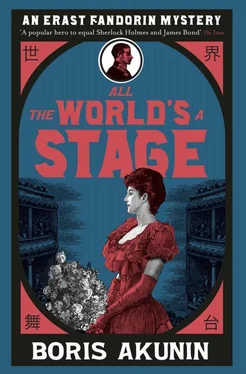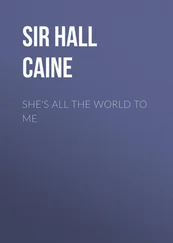Eliza felt terribly sorry for her – this plain, skinny girl who was funny even in this moment of frank sincerity. Although (Eliza’s professional memory prompted her), hadn’t Comedina used the same tone of comic despair in the role of Victor Hugo’s Gavroche? Once an actress, always an actress.
They sat beside each other dejectedly without speaking, each thinking her own thoughts.
And then, after being away for half an hour, Noah Noaevich finally returned and the miracles began.
TO HELL WITH THE CHERRY ORCHARD !
Eliza hadn’t seen Stern in such an elated mood for a long time. Recently he had been acting out an upsurge of enthusiasm rather skilfully, but there is no way to deceive the eye of an actress: she could see perfectly well that Noah Noaevich was dissatisfied, that he was concerned about the success of his new production. And now suddenly this soaring elation. What could the reason be?
‘Ladies and gentlemen! My friends!’ Stern exclaimed, surveying his colleagues with his eyes all aglow. ‘Miracles do not only happen on the stage. Today, as if in recompense for our loss, fate has presented us with a most generous gift. Look at this man…’ He indicated his companion with a sweeping gesture. ‘Who is he, in your opinion?’
‘The repertoire manager,’ someone answered in surprise. ‘We’ve already seen him today.’
‘Mr Fandorin, Erast Petrovich,’ prompted Shiftsky, who had returned unnoticed at some moment or other. He had always possessed a quite outstanding memory for names.
‘No, my comrades! This man is our saviour! He has brought us a quite fantastically promising play!’
Nonarikin gasped.
‘But what about The Cherry Orchard ?’
‘To hell with The Cherry Orchard ! Take the axe to it, your Lopakhin is right! Erast Petrovich’s play is new, and no one except me has read it! It is ideal in every respect. In the complement of roles, the theme and the plot!’
‘Where did you obtain it, Mr Repertoire Manager?’ Reginina asked. ‘Who is the author?’
‘ He is the author!’ Stern laughed, delighted by the general amazement. ‘I explained to Erast Petrovich what kind of play we need, and instead of searching for one he sat down and – hey presto! – wrote it himself. In ten days! Exactly the kind of play that I was dreaming about! Even better! This is phenomenal!’
Of course, there was hubbub. Those who were satisfied with their parts in The Cherry Orchard were indignant; the others, on the contrary, expressed their ardent approval.
Eliza said nothing for a while, looking at the handsome, grey-haired man with new interest.
‘Enough arguing,’ she said eventually. ‘When will we be able to acquaint ourselves with the text?’
‘This very moment,’ Noah Noaevich declared. ‘I have run my eyes over it. As you know, I possess the skill of photographic reading; however, this text has to be heard. The play is written in blank verse.’
‘Oh, really?’ said Gullibin, astounded. ‘In the style of Rostand, is it?’
‘Yes, but with an oriental flavour. How timely this is! The public is crazy about everything Japanese. Please, Erast Petrovich, take my seat and read.’
‘But I have a st-stammer…’
‘That’s not important. Please, ladies and gentlemen!’
Everyone applauded and Fandorin, tugging on his neat black moustache, took a sheaf of paper out of a folder.
‘ TWO COMETS IN A STARLESS SKY ,’ he read out, and explained: ‘This is a title in the tradition of the Japanese theatre. My text is eclectic to some degree, something has been taken from kabuki , something from joruri , the old puppet theatre form, that is, from…’
‘Just read it, you can explain everything that’s not clear afterwards,’ Stern interrupted impatiently, winking at the actors, as if to say: Just you wait, now I’ll see you gasp.
‘Very well. Of course. I beg your pardon.’ The author coughed to clear his throat. ‘There is also a subtitle: “A puppet theatre play in three acts with songs, dances, tumbling tricks, sword-fighting scenes and michiyuki .’
‘What’s that?’ Sensiblin asked. ‘I didn’t understand the last word.’
‘That is a traditional kind of scene, in which the characters are on a journey,’ Fandorin explained. ‘For the Japanese the concept of the Path or the Road is very important, and so the michiyuki scenes stand out especially.’
‘That’s all, no more questions!’ Stern growled. ‘Read!’
Everyone settled down in their seats. No one knows how to listen to a new play like the actors who are going to play in it.
The same tense expression appeared on all their faces – each of them was trying to work out which part he or she would get. As the reading proceeded, one after another the listeners relaxed, having identified their roles. This reaction alone was enough to demonstrate that they liked the play. It’s a rare thing to find a play in which every actor has an impressive entrance, but Two Comets belonged to precisely this category. The characterisations fitted very neatly, and so there was nothing to quarrel over.
Eliza also identified her own part with no difficulty: the geisha of the first rank Izumi. Very interesting. She could sing and, what was more, dance as well – well, God be praised; Eliza had graduated from ballet school, after all. And she could have such kimonos made, and such hairstyles!
It was simply astounding how she could have been so blind – a woman who apparently wasn’t stupid and had seen something of life. How could she have failed to appreciate Mr Fandorin at his true worth? His grey hair and black moustache were so very stylish! And what a pleasant, manly voice he had. While he was reading his stammer disappeared completely. That was actually rather a pity – this slight speech defect really had a certain charm to it.
Ah, what a play it was! Not a play, but a miracle!
Even Xanthippe Petrovna Vulpinova was ecstatic. And no wonder – she didn’t often get such an appetising role.
‘Bravo, Erast Petrovich!’ the villainess called out first of all when the author said: ‘Curtain. The end’. ‘A new Gogol has appeared amongst us.’
Everyone jumped to their feet and gave a standing ovation. They shouted:
‘This is a hit!’
‘The season will be ours!’
‘Banzai!’
Kostya Shiftsky made everyone laugh by imitating a Japanese accent.
‘Nemirovich and Stanislavsky will commit hara-kiri,’ and he mimed plump Nemirovoch-Danchenko and skinny Stanislavsky with his pince-nez, slitting open their stomachs.
The only one not to join in the universal jubilation was Nonarikin.
‘I didn’t understand what parts you and I will get, teacher,’ he said with mingled hope and suspicion.
‘Well I, naturally, shall be the Storyteller. A unique opportunity to direct the tempo of the action and the actors’ playing from right there onstage. A combined producer and director, a brilliant innovation. And you, my dear Georges, will get three roles: the First Assassin, the Second Assassin and the Invisible One.’
The assistant director glanced at the notes he had made during the reading.
‘But I beg your pardon! Two of these roles have no words, and the third has words, but no one can see the character!’
‘Naturally. He is an Invisible One. But what expressive lines! And then, the Invisible One is the core, the driving motor of the action. And in the roles of the hired killers you can demonstrate your brilliant sword-fighting skills. You told me yourself that at military college you were the top cadet in the fencing class.’
Flattered by these compliments, Nonarikin nodded, but somewhat uncertainly.
Читать дальше









